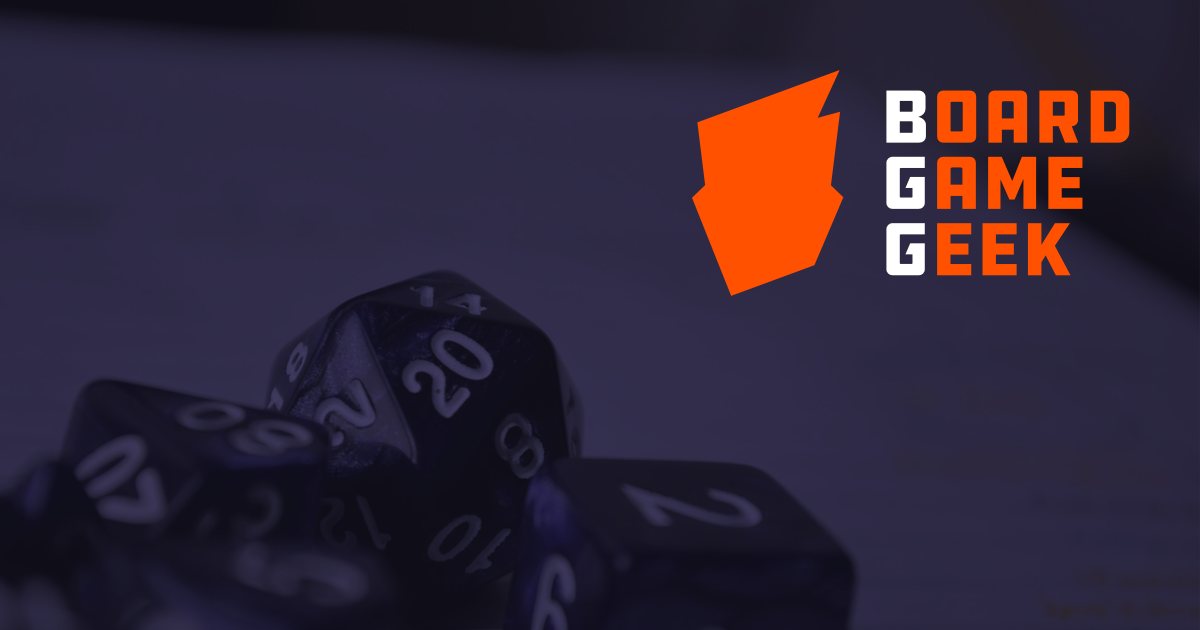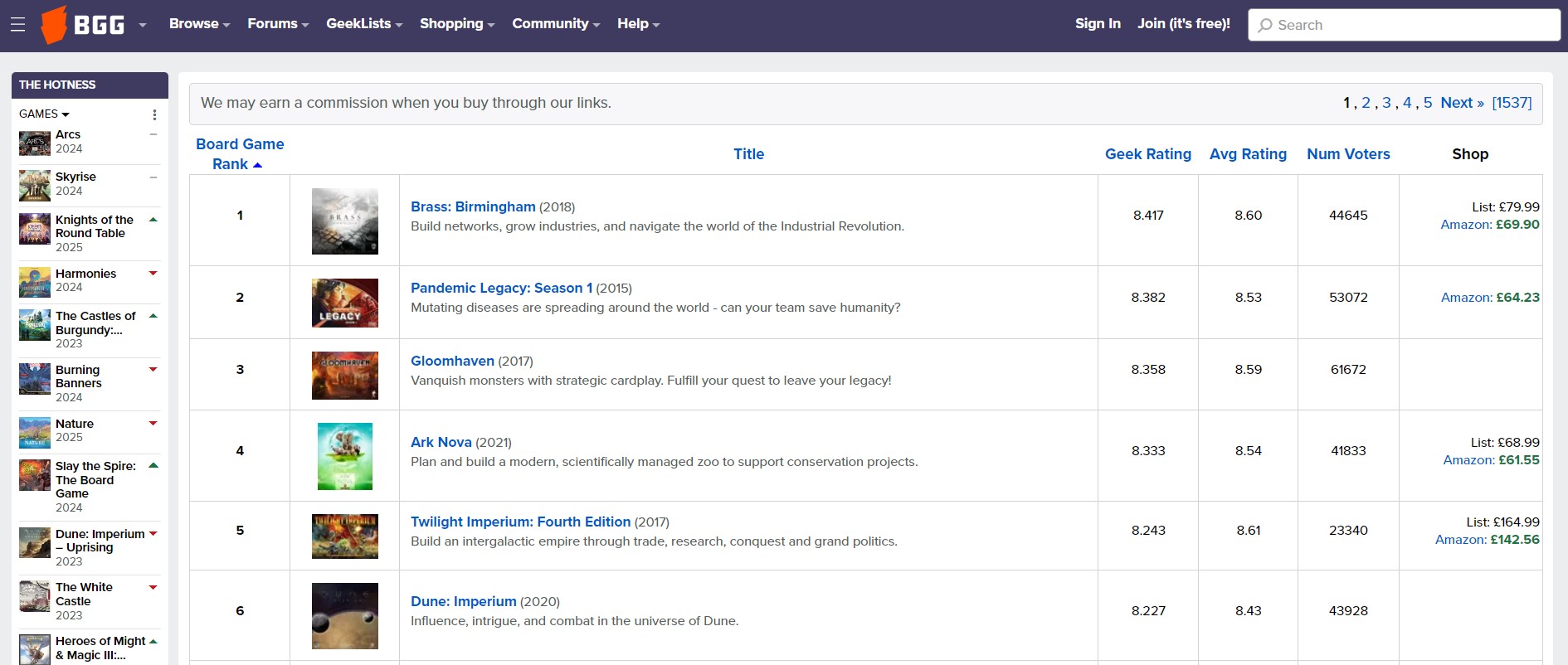17 April 2024
|
If you’re interested enough in games to be holding Tabletop Gaming magazine in your hands, you’ll likely be familiar with at least the existence of Board Game Geek, if not a regular visitor to it. But what is it, where did it begin, and why is it important to the tabletop community?
Words by Charlie Pettit
What is Board Game Geek (BGG)?
Board Game Geek (BGG) is a website that “aims to be the definitive source for board game and card game content”, a goal it has arguably achieved. It’s essentially a database of board games, whereby an entry is created for new games, that shares core information about it. Users can note the games they own or want to own, can rate the games they’ve played, and can engage with the wider board game community about them. Because it’s so widely used, it has information on an incredible amount of board games – over 400,000 entries exist in the system itself – it’s the go-to place to find out what you may need to know about almost any game.
What is Board Game Geek used for?
A normal entry will include the name and year, details like the publishers, board game designers, artists, and aspects like player counts and time to play. You’ll also see an image of the game, which often includes those uploaded by others. Then there’s a wealth of additional community information – forums, reviews, blog posts, video links, and more. If you want to know something about a game, it’s likely Board Game Geek will have the information.

Keep track of the board games you've played
Most users will be familiar with it though as a way to track the games they own and like. The review system means you can easily rate your games, as well as add to your own list of wishlists, or games you own but haven’t played. They can also rate things like how heavy a game is – Twilight Imperium the other end of the spectrum to Ticket to Ride for example – and these ratings, reviews and weight, contribute to a collective score for the game. You can view these overall scores, of which the first page of the ranked results, showing 100 at a time, has become a known entity – the Board Game Geek Top 100 – an accolade that publishers actively seek.
When did Board Game Geek start?
One glimpse at Board Game Geek’s User Interface suggests it shares a timeline with Wikipedia, but in fact, it outdates it. It began instead from computer game foundations, with 3DGameGeek.com being launched by Scott Alden and his friends – a version is preserved with the internet archive Wayback Machine, which offers some familiar 90’s style web page design, but equally some similarity in features to what would eventually become BGG. Alden was a programmer, of which video gamers will recognise work on the likes of Sin and Duke Nukem Forever (the original, long before its very delayed release).
Alden’s personal interest in board games only grew, and he describes buying German games without any real information about them. At the time, there were no easily accessible areas for reviews or feedback, and it wasn’t until he befriended Derk Solko (eventually the BGG Co-founder), that he was introduced to an email newsletter list that gave him access to new gaming information and commentary. This sparked the question - what if there was somewhere you could go to find out these things?
Using 3DGameGeek.com as a foundation, BGG was launched in January 2000, as a database containing firstly their own games (which makes our feature on page 10 all the more interesting!), and session reports, and then any they could gain information on. They began tracking aspects - in the early days this would be ratings, but later included the likes of how heavy the game is thematically, and allowing for uploads. At the time, rules were often in German only, and so being able to upload and share English language versions was significant.
As its popularity increased, Alden quit his full-time job to work on Board Game Geek, adding many of the features we enjoy today – from forums to ratings, geek gold to trading, images to files, and of course, unique user logins to keep track of games.
Is Board Game Geek just for Board Games?
If having thousands of Board Game entries, data, and reviews wasn’t enough, Board Game Geek isn’t just limited to the above. Its sister site, RPGGeek, does the same for RPGs as Board Games do, and whilst 3D Game Geek no longer exists, VideoGameGeek does – Portal 2 is the top rated game, for anyone wondering – although arguably, neither of these have been embraced in the same way Board Game Geek has.
Another area Board Game Geek flourishes in is events – BGG Spring, taking place in Dallas in May, BGG Con in November, a Tabletop Network Conference in November, and, most impressive sounding of all, is a BGG Cruise, with BGG@SEA. This is made up of two cruises with Royal Caribbean, where all your usual cruise activities take place, but there are a whole load of extra board game related events and activities available too.
Related article: Beginners Should Go To Disney Lorcana Competitions (and here's why)
Why is Board Game Geek important?
Board Game Geek has a huge place in the industry now, being the go-to for players, review seekers, casual gamers and hobby gamers alike. Lacking a Board Game Geek entry is notable, and suggests a lack of authenticity. Conversely, a great rating, can really make a game. Some games even begin life in forums, files, or digital competitions, before heading to our tabletop. Games can generate buzz by being on the “hotlist” alone – a list generated by board game interest. A wholly community based site, run for free (fundraisers are run each year for ongoing costs, upsells are available but don’t impact the free usage if not taken up), with an astonishing user base and millions of data entry points compiled by the community – it’s as impactful as Wikipedia has been in day to day lives, to Board Gamers.

What is the Board Game Geek Top 100?
The Board Game Geek Top 100 is the first set of ranked results when you go to browse board games. It is made up of thousands of individual rankings from players, offering numerical values for how much they like a game, and resulting in a list of what is considered the best – with some algorithms adjusting for potential changes as needed. We’ll be taking a look at each of those games, offering a few deep dives and fun facts, and wondering how many you’ve played? Grab a pen to tick it off, we’ll find out.
Ultimately, there’s something wonderfully table like about how Board Game Geek is. It’s a wider community of people who just like playing games and talking about it, sharing knowledge and views – kind of like when we all gather round to play a game together. There’s no barrier to entry, no paywall to be dissuaded by, and is a comfortable home to many a board game geek.








Comments
Login or register to add a comment
No comments